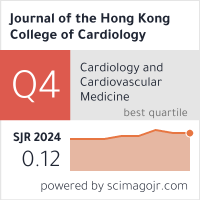Abstract
Statin medication has shown good results in the prevention of the postoperative atrial fibrillation (AF) after coronary artery bypass grafting (CABG).
Objective: To assess the role of statin medication in the prevention of AF after CABG.
Material and Methods: A retrospective analysis of 225 medical records of the patients, aged 57.5±7.9 years (mean±SD), who underwent CABG. All patients was divided into two groups. The first group included those patients who did not received statin medication (n=93). We named this group as nSt-patients. Second group included patients who receive statin medication (n=132). We named this group as St-patients. Clinical data on all included patients were obtained in pre-, intra- and postoperative periods. The risk of occurrence of postoperative AF was evaluated using the Cox-regression model. Continuous variables were reported as medians (Me) with inter-quartile ranges (Q1, Q3). Categorical data were presented as percentages.
Results: The rate of AF was 29% in nSt-patients and 9% in St-patients (P<0.001). On Day 4 after surgery, white blood cells (WBC) count was 10.9 (9.0, 13.0) ×109 e/L in nSt-patients and 9.1 (7.6, 10.0) in St-patients (P<0.001). An analysis of WBC count day- to-day changes was performed in a subgroup of patients who developed postoperative AF. This analysis showed that the peak WBC numbers occurred on the day of arrhythmia manifestation. In this subgroup, WBC count increased from 10.4 (7.5, 12.3) on Day 1 after surgery to 10.9 (9.0, 13.0) ×109 e/L on the day of onset of AF (P=0.008). According to the Cox-regression model, the risk of AF was 3.68 for prior AF and 0.31 for statin medication.
Conclusion: In our study, we showed an association between the use of statin medication and AF in early postoperative period.
Recommended Citation
Olga L Bockeria, L Vladimir A Shvartz, Albert A Akhobekov, Zalina F Kudzoeva, Efficacy of Statin Therapy in the Prevention of Atrial Fibrillation in Patients after Coronary Artery Bypass Grafting Journal of the Hong Kong College of Cardiology 2016;24(1) https://doi.org/10.55503/2790-6744.1021
Creative Commons License

This work is licensed under a Creative Commons Attribution-Noncommercial-No Derivative Works 4.0 License.



